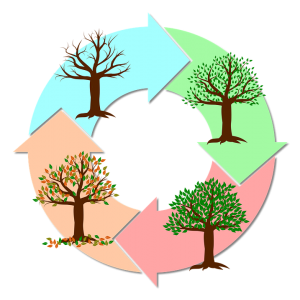Phenology
Phenology is the study that measures the timing of life cycle events in all living organisms. The life cycle of an organism is the period of time involving a single generation through reproduction. So, when we think of a life cycle in an organism, we are not necessarily referring to its life span, but rather, the period of time it takes to reproduce a generation. Life cycle events are also known as phenophases. In plants, this includes first leaf, budburst, first flower, last flower, first ripe fruit, seed dispersal, and leaf colour change (among others). In animals, the phenophases include mating, offspring production, molting, hibernation, and migration (among others).
Scientists who study phenology are called phenologists. They are interested in the timing of specific biological events with relation to seasonal and climatic changes. Seasonal and climatic changes are some of the non-living, or abiotic , components of the environment that impact the living, or biotic components. Seasonal changes can include variations in day length, temperature, and rain or snowfall. Phenologists attempt to learn more about the abiotic factors that plants and animals respond to.
Species use the predictable yearly changes in the climate to determine when they start natural events such as breeding or flowering.
The three main abiotic factors that influence phenology are:
- Sunlight
- Temperature
- Precipitation (rainfall, snowfall, etc.)
These three factors work together to determine the timing of natural events.



 This project (EDU-ARCTIC) has received funding from the European Union’s Horizon 2020 research and innovation programme under grant agreement No 710240. The content of the website is the sole responsibility of the Consortium and it does not represent the opinion of the European Commission, and the Commission is not responsible for any use that might be made of information contained.
This project (EDU-ARCTIC) has received funding from the European Union’s Horizon 2020 research and innovation programme under grant agreement No 710240. The content of the website is the sole responsibility of the Consortium and it does not represent the opinion of the European Commission, and the Commission is not responsible for any use that might be made of information contained.